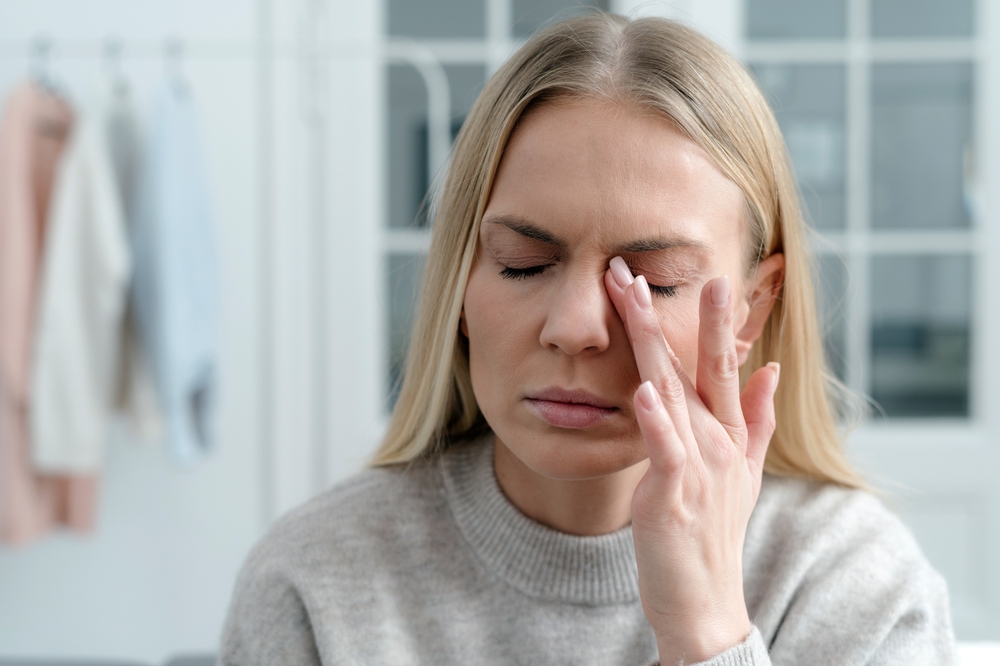What Are the Most Common Symptoms of Dry Eye Syndrome?
October 10th, 2023
Dry, irritated eyes are no fun. If your eyes frequently feel gritty, sting, or water excessively, you may have a common condition called dry eye syndrome.
Dry eye disease is very common and becomes more common with age. How do you know if you have dry eye syndrome?
Keep reading to learn more about dry eye syndrome, including the most common symptoms!
What is Dry Eye Syndrome?
When the tears your eyes produce are too few in quantity or too poor in quality, it can lead to dry eye syndrome. Tears lubricate the eye and reduce the chance of eye infection.
Each time you blink, a tear film spreads across the surface of your eye. This keeps your vision clear and bright, nourishing and protecting the eye.
A healthy tear film has three layers: oil, water, and mucus. The outside of the tear film is the oily layer.
It smooths the surface of the tear and keeps tears from evaporating. This oily layer is produced by the meibomian glands of the eye.
When it’s blocked, this can affect tear production. The middle of the tear film is the watery layer.
It bathes and cleans the eye, washing away dirt and foreign particles. This watery layer is produced by the lacrimal glands.
The layer of the tear film closest to the surface of your eye is the mucus layer. This layer is sticky and keeps the eye’s surface moist by spreading the watery layer evenly across the eye.
This mucus layer is produced by the conjunctiva. The conjunctiva is a clear tissue that covers the whites of your eye and the inside of your eyelids.
What Causes Dry Eye Syndrome?
When normal tear production slows down, dry eye syndrome develops. Alternatively, if the three layers of the tear film don’t function properly, this can also lead to dry eye.
Aging is the most significant risk factor. Tear production changes as you age.
Most people over sixty-five years of age have some symptoms of dry eye. However, the condition is more common in women due to hormonal changes brought on by pregnancy and menopause in particular.
Medications such as antihistamines, decongestants, blood pressure medications, and heartburn medications can also contribute to dry eye as these can lead to reduced tear production. Additionally, environmental conditions such as exposure to smoke, wind, or a very dry climate can exacerbate dry eye symptoms.
What Are Common Symptoms of Dry Eye Syndrome?
Dry eye syndrome can cause irritation, visual changes, and sensitivity to environmental factors. Some of the most common symptoms include:
- Stinging, burning, or scratchy sensation in the eyes
- Feeling like something is in your eye or an eyelash is rubbing against your eyeball
- Excessive tear production or watery eyes that overflow, especially in windy conditions
- Blurred vision or difficulty seeing clearly, especially when doing close-up work like reading or using a computer
- Trouble wearing contact lenses for long periods
- Red eyes
- Mucus discharge in or around the eyes
The degree of dryness and irritation can fluctuate throughout the day. Symptoms may be worse in the morning upon waking or later in the day.
How is Dry Eye Treated?
Over-the-counter remedies such as artificial tears supplement natural tear production. They are helpful in milder cases of dry eye.
Lifestyle changes can make a difference. Keep track of activities that reduce blinking, including looking at a computer screen for prolonged periods or reading. Limit time on screens to reduce eye strain.
Reduce the number of hours you wear contacts. Prescription medications are used to treat dry eye. They can include drugs to reduce eyelid inflammation and tear-stimulating drugs.
Your eye doctor at Laser Eye Center will determine which method of treatment is best for you depending on the cause of your symptoms.
Are you experiencing symptoms of dry eye? Schedule an appointment at Laser Eye Center in Decatur, AL, today!



